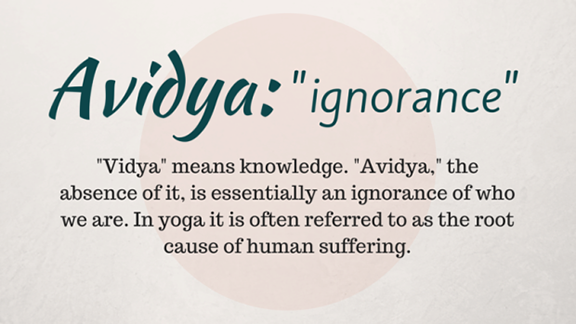 Rev. Jaganath, Integral Yoga Minister and Raja Yoga master teacher, has spent a lifetime delving into the deepest layers of meaning in Patanjali’s words within the Yoga Sutras. Our series continues with sutras: 2.4 and 2.5. Here, Patanjali elucidates further on the klesas, the five causes of our human suffering, starting with the first klesa, avidya or ignorance—the foundation upon which the remaining klesas rest.
Rev. Jaganath, Integral Yoga Minister and Raja Yoga master teacher, has spent a lifetime delving into the deepest layers of meaning in Patanjali’s words within the Yoga Sutras. Our series continues with sutras: 2.4 and 2.5. Here, Patanjali elucidates further on the klesas, the five causes of our human suffering, starting with the first klesa, avidya or ignorance—the foundation upon which the remaining klesas rest.
Sutra 2.4: avidya kṣetraṃ uttareṣaṃ prasupta-tanu-vichchinna-udārāṇām
Ignorance is the field for the others [other klesas] mentioned after it, whether they be dormant, feeble, intercepted or sustained (Swami Satchidananda translation). Ignorance is the origin of the other root causes of suffering (klesas), whether they are dormant, weakened, interrupted, or fully active (Rev. Jaganath translation).
avidya = ignorance; not-knowing, delusion, nonwisdom (See 2.3, 2.4, 2.5, 2.24; refer to 2.3 for more on avidya).
kṣetraṃ = origin; field, ground
from kṣi = possess
uttareṣaṃ = of the others
prasupta = dormant; fallen, asleep, inactive, latent
from pra = before, forward + supta = from svap = sleep
tanu = weakened; feeble, attenuated, lessened, diminished, small, thin
from tan = stretch, spin out
vichchinna = interrupted; intercepted, suppressed, overpowered
from vi = asunder, away + chinna, from chid = cut
udārāṇām = fully active; engaged, sustained, aroused
from ud= up, forth, out + āra, from the root ṛ = go
Sutra 2.5: anitya-aśuci-duḥkha-anātmasu nitya-śuci-sukha-ātman-khyātir avidyā
Ignorance is regarding the impermanent as permanent, the impure as pure, the painful as pleasant and non-Self as the Self (Swami Satchidananda translation).
Ignorance is rooted in misperception. It is due to experiencing:
- What changes as unchanging
- What is impure, colored by bias, and nonvirtuous as pure, free of bias, and virtuous
- What brings pain, restlessness, dissatisfaction, and distress as that which brings serenity, contentment, fulfillment, and happiness
- What is not the Self as the Self
(Rev. Jaganath translation)
anitya = changes; impermanent, transient, fleeting, not everlasting, occasional, nonessential, unimportant, uncertain
from a = not + nitya = eternal, from ni = lend
The definitions of this word suggest that ignorance is not just concerned with black and white, true/not true situations. It is simply getting whole swaths of life wrong: regarding what is nonessential as essential, unimportant as important, what is uncertain and can’t be counted on, as trustworthy. This nuanced look at one of the contributory factors of ignorance helps keep us from simply identifying our big mistakes and shortcomings as born of ignorance. Ignorance most often is a silent killer of happiness, found in misperceiving or having a dysfunctional relationship with the minutia of life. We need to always keep in mind that clinging is out of step with the rhythms of life.
aśuci = impure
from a = not + śuci = pure, from śuc = gleam
duḥkha =pain, restlessness, dissatisfaction, distress; dissatisfaction (to feel that life is flawed in our eyes), discontent, anxiety, stress, pain, uneasiness, difficulty, sorrow, trouble, to cause or feel pain, unpleasant. Refer to 1.31 for more on duhkha.
anātmasu = not self
from an = not + ātma = self
nitya = unchanging; permanent
śuci = pure; shining, glowing, gleaming, radiant, bright, white, clear, clean, pure, honest, virtuous, holy, a true friend, the condition of a religious student, untainted
from suc = to gleam, glow, burn, suffer violent heat or pain, be absorbed in deep meditation
The yogi seeks to think, speak, and act without selfish attachment. This gradually thins and ultimately overcomes the power that fear, lust, greed, anger, hatred, obstinacy, and laziness have to obstruct the inner Light.
Essential to purity is clarity of intentions and acknowledgment of our strengths and weaknesses. It is a balanced mind, free from bias and the limited self-interest that can cloud our innate capacity for good judgment and for serving the common good.
sukha = happiness; pleasure, joy, well being, running swiftly or easily (applied to cars or chariots), easy, agreeable, gentle, mild, comfortable, happy, prosperous, virtuous, pious, the sky, heaven. Refer to 1.33 for more on sukha.
ātman = self ; the principle of life and sensation, the individual self, soul, essence, nature, character, peculiarity, the person or whole body considered as one as opposed to the separate members of the body, the body, the understanding, intellect or mind, the highest personal principle of life, effort, firmness, the sun, fire, a son
from the verb root at = to breathe, or the verb root ap = to pervade or reach up for, or from
at = to move
This word has several meanings, but the two most common uses in Hindu spiritual contexts are atma as the individual self or soul and atma as the Supreme Self or the spark of Divinity within. Since capital letters are not part of Sanskrit, the only way to tell which meaning is intended is by context, and even then, it can be a tricky.
One way of understanding atman is that it is Brahman (the highest attributeless Reality) as viewed from within the individual; the Self or Seer within each individual. This understanding is found in the philosophical school of nondualism, Advaita Vedanta. Yoga and its related philosophical sister, Sankhya philosophy, tend to regard the atma as identical with self-luminous, omnipresent consciousness.
Experiencing the not-Self as Self refers to the mind’s tendency, under the influence of ignorance, to try to define the Self. The nature of the mind is to persevere in its attempts to limit the pure Self, assign it attributes, and somehow bring it under the control of the ego. This is perhaps why the moment that best depicts the objective of Patanjali’s Yoga comes in sutras 4.25 and 4.26, where it states that once the seeker is able to distinguish the atma from the mind, thoughts of the mind as atma cease forever and the seeker experiences the pull of the Absolute toward liberation (kaivalya). A similar idea is presented in sutra 3.50 which states that when an individual can discern the difference between the pure sattvic mind and the Purusha (Self, Seer), there arises all knowledge and knowledge of all states of being.
The other sutras that contain the word, atma:
- 25 – one symptom of ignorance is regarding the non-Self as the Self
- 21 – the seen exists (atma) for the sake of the Seer
- 41 – by purification, one attains (among other benefits) fitness of Self- realization
- 13 – characteristics that form the nature (atma) of the gunas
Other texts state that the atma is the ultimate essence of the universe as well as the vital breath in human beings.
Buddhism denies the reality of the atma as intrinsically real.
khyātir = regarding; seeing, identification, asserting, viewing (See 1.16)
avidyā = ignorance (See 2.3, 2.4, 2.5, 2.24); not-knowing, nonwisdom
from a = not + vid = to know, feel, experience, being, existing, obtaining, to declare to be, understand, seize, visit, discover, recognize
About the Author:
 Reverend Jaganath Carrera is and Integral Yoga Minister and the founder/spiritual head of Yoga Life Society. He is a direct disciple of world renowned Yoga master and leader in the interfaith movement, Sri Swami Satchidananda—the founder and spiritual guide of Satchidananda Ashram–Yogaville and Integral Yoga International. Rev. Jaganath has taught at universities, prisons, Yoga centers, and interfaith programs both in the USA and abroad. He was a principal instructor of both Hatha and Raja Yoga for the Integral Yoga Teacher Training Certification Programs for over twenty years and co-wrote the training manual used for that course. He established the Integral Yoga Ministry and developed the highly regarded Integral Yoga Meditation and Raja Yoga Teacher Training Certification programs. He served for eight years as chief administrator of Satchidananda Ashram–Yogaville and founded the Integral Yoga Institute of New Brunswick, NJ. He is also a spiritual advisor and visiting lecturer on Hinduism for the One Spirit Seminary in New York City. Reverend Jaganath is the author of Inside the Yoga Sutras: A Sourcebook for the Study and Practice of Patanjali’s Yoga Sutras, published by Integral Yoga Publications. His latest book, Patanjali’s Words, is coming soon from Integral Yoga Publications.
Reverend Jaganath Carrera is and Integral Yoga Minister and the founder/spiritual head of Yoga Life Society. He is a direct disciple of world renowned Yoga master and leader in the interfaith movement, Sri Swami Satchidananda—the founder and spiritual guide of Satchidananda Ashram–Yogaville and Integral Yoga International. Rev. Jaganath has taught at universities, prisons, Yoga centers, and interfaith programs both in the USA and abroad. He was a principal instructor of both Hatha and Raja Yoga for the Integral Yoga Teacher Training Certification Programs for over twenty years and co-wrote the training manual used for that course. He established the Integral Yoga Ministry and developed the highly regarded Integral Yoga Meditation and Raja Yoga Teacher Training Certification programs. He served for eight years as chief administrator of Satchidananda Ashram–Yogaville and founded the Integral Yoga Institute of New Brunswick, NJ. He is also a spiritual advisor and visiting lecturer on Hinduism for the One Spirit Seminary in New York City. Reverend Jaganath is the author of Inside the Yoga Sutras: A Sourcebook for the Study and Practice of Patanjali’s Yoga Sutras, published by Integral Yoga Publications. His latest book, Patanjali’s Words, is coming soon from Integral Yoga Publications.

